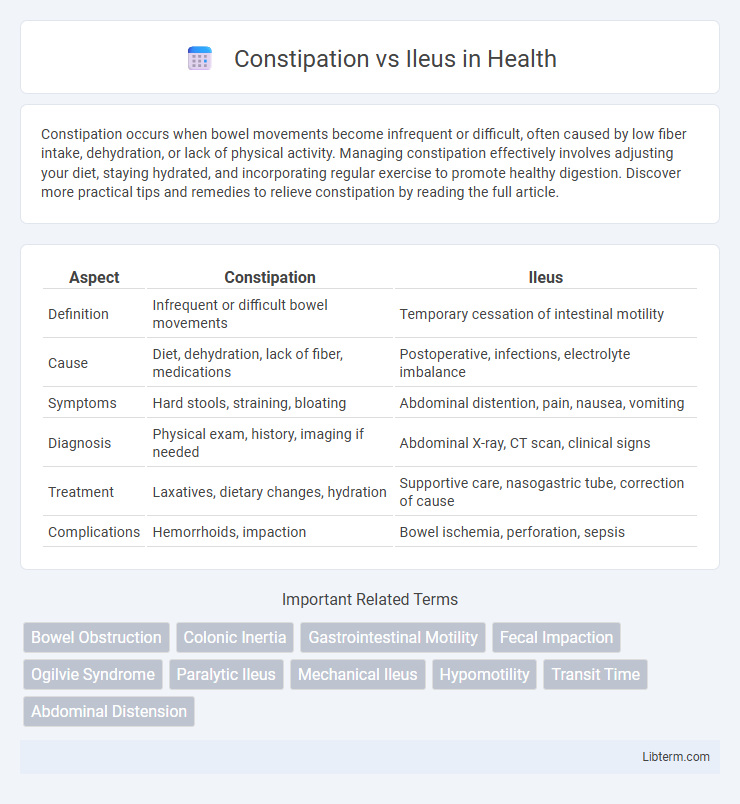Constipation occurs when bowel movements become infrequent or difficult, often caused by low fiber intake, dehydration, or lack of physical activity. Managing constipation effectively involves adjusting your diet, staying hydrated, and incorporating regular exercise to promote healthy digestion. Discover more practical tips and remedies to relieve constipation by reading the full article.
Table of Comparison
| Aspect | Constipation | Ileus |
|---|---|---|
| Definition | Infrequent or difficult bowel movements | Temporary cessation of intestinal motility |
| Cause | Diet, dehydration, lack of fiber, medications | Postoperative, infections, electrolyte imbalance |
| Symptoms | Hard stools, straining, bloating | Abdominal distention, pain, nausea, vomiting |
| Diagnosis | Physical exam, history, imaging if needed | Abdominal X-ray, CT scan, clinical signs |
| Treatment | Laxatives, dietary changes, hydration | Supportive care, nasogastric tube, correction of cause |
| Complications | Hemorrhoids, impaction | Bowel ischemia, perforation, sepsis |
Introduction to Constipation and Ileus
Constipation is characterized by infrequent, difficult, or painful bowel movements often caused by dietary factors, dehydration, or decreased physical activity. Ileus refers to a temporary and often reversible cessation of intestinal motility, leading to bowel obstruction symptoms without a mechanical cause. Both conditions disrupt normal gastrointestinal function but differ in underlying pathophysiology and clinical management.
Key Differences Between Constipation and Ileus
Constipation is a common gastrointestinal condition characterized by infrequent or difficult bowel movements due to slow colonic transit or blockage, whereas ileus is a temporary cessation of intestinal motility causing functional obstruction without a physical blockage. Key differences include etiology, with constipation often caused by dietary factors or chronic laxative use, while ileus results from surgery, infection, or electrolyte imbalances. Clinically, constipation presents with hard stools and straining, whereas ileus manifests as abdominal distension, absent bowel sounds, and severe pain requiring immediate medical intervention.
Causes of Constipation
Constipation primarily results from insufficient dietary fiber intake, dehydration, sedentary lifestyle, and certain medications like opioids or antacids. Underlying medical conditions such as hypothyroidism, diabetes, or irritable bowel syndrome often contribute to chronic constipation. Unlike ileus, which is caused by a temporary disruption of bowel motility often due to surgery or infection, constipation is more related to mechanical or functional bowel irregularities.
Causes of Ileus
Ileus primarily results from disruptions in the normal coordinated muscle contractions of the intestines, often caused by abdominal surgery, infections, electrolyte imbalances, or certain medications such as opioids and anticholinergics. Unlike constipation, which is typically linked to dietary factors and bowel habits, ileus arises from impaired intestinal motility due to neurological or muscular dysfunction. Understanding the diverse etiologies of ileus is essential for accurate diagnosis and effective treatment.
Symptoms Comparison: Constipation vs Ileus
Constipation typically presents with infrequent, hard, and difficult-to-pass stools, accompanied by abdominal discomfort and bloating. Ileus manifests as a severe reduction or absence of intestinal motility, causing abdominal distension, pain, nausea, vomiting, and inability to pass gas or stools. Differentiating symptoms include the acute onset of nausea and vomiting in ileus versus the chronic, gradual symptom progression seen in constipation.
Diagnostic Approaches for Constipation and Ileus
Diagnostic approaches for constipation typically involve thorough medical history, physical examination, and tests such as abdominal X-rays, colonoscopy, and anorectal manometry to assess bowel function and structural abnormalities. Ileus diagnosis relies heavily on imaging techniques like abdominal radiographs and CT scans to identify bowel dilation and absence of obstruction, alongside laboratory tests to detect electrolyte imbalances or infection. Both conditions require careful differentiation through clinical evaluation and targeted diagnostic tools to ensure appropriate management.
Treatment Options for Constipation
Treatment options for constipation include dietary changes such as increasing fiber intake and hydration, use of over-the-counter laxatives like bulk-forming agents, stool softeners, and osmotic laxatives, as well as prescription medications including lubiprostone and linaclotide for chronic cases. Behavioral interventions like regular exercise and establishing consistent bowel habits also play a critical role in improving bowel function. Severe or refractory cases may require further evaluation to rule out underlying conditions or consideration of surgical interventions in rare instances.
Treatment Strategies for Ileus
Treatment strategies for ileus primarily involve bowel rest, nasogastric decompression, and correction of underlying electrolyte imbalances to restore normal gastrointestinal motility. Intravenous fluids are administered to maintain hydration and electrolyte balance while minimizing the use of opioids and other medications that may exacerbate the condition. In severe cases, surgical intervention may be necessary to address mechanical obstructions or complications associated with prolonged ileus.
Complications of Constipation and Ileus
Constipation can lead to complications such as fecal impaction, hemorrhoids, anal fissures, and in severe cases, bowel obstruction. Ileus, characterized by a temporary impairment of intestinal motility, may result in complications including abdominal distension, electrolyte imbalances, bowel ischemia, and perforation. Both conditions, if untreated, can cause significant morbidity requiring prompt diagnosis and management to prevent life-threatening outcomes.
Prevention and Lifestyle Tips
Preventing constipation involves a high-fiber diet rich in fruits, vegetables, and whole grains, adequate hydration of at least 8 glasses of water daily, and regular physical activity to stimulate bowel movements. Ileus prevention centers on minimizing risk factors such as postoperative immobilization by encouraging early ambulation, managing electrolyte imbalances, and avoiding unnecessary opioid use that can impair gastrointestinal motility. Both conditions benefit from stress management techniques and routine medical check-ups to ensure overall digestive health and timely intervention.
Constipation Infographic

 libterm.com
libterm.com